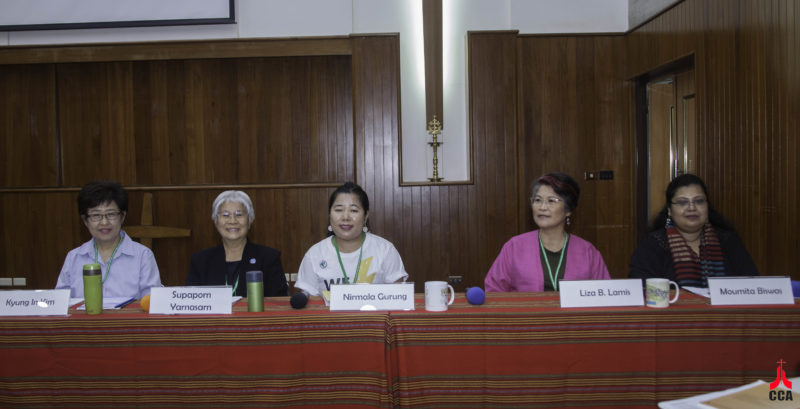Ecumenical women’s organisations should strengthen the Asian ecumenical movement, opine AEWA participants
 Panel Presentation on 'Towards Revitalising Ecumenical Movement and Role of Asian Ecumenical Women's Organisations'
Panel Presentation on 'Towards Revitalising Ecumenical Movement and Role of Asian Ecumenical Women's Organisations'
"The ecumenical movement and partnership of organisations must be strengthened without any fragmentation or duplication of activities in the same constituencies," was the common concern echoed by the participants of the Asian Ecumenical Women’s Assembly (AEWA) during a lively discussion on a panel session that dealt with the role of various ecumenical women’s organisations.
In response to presentations by officers of various women’s organisations at a panel session on ‘Towards Revitalising Ecumenical Movement and Role of Asian Ecumenical Women’s Organisations’ on the fifth day of the AEWA, several participants emphasized the need for more ecumenical collaborations and unified initiatives.
In order to avoid competition among Asian women’s organisations, more concerted efforts of collaborations and cooperation among Asian Christian women’s organisations need to be ensured by those who are in the leadership of their respective organisations, opined the respondents.
The participants elucidated the need for strengthening the current Asian ecumenical movement by collaborating on all areas of mutual concern, without an overlap or replication of efforts. The way to move forward, they said, was to develop issue-based projects by concentrating limited financial and human resources at common disposal.
Panellists representing various ecumenical organisations shared unique roles and contributions of women’s organisations within Asia’s ecumenical journey, and unanimously agreed on the pressing need for collaboration and action.
Dr Supaporn Yarnasarn from the Asian Church Women’s Conference (ACWC) talked about how the ACWC has been a space for Asian women ever since it was started six decades ago. The organisation is marked by its work beyond the barriers and binaries of women and men, poor and rich, and racial or cultural differences.
Nirmala Gurung from the World Young Women’s Christian Association (YWCA) delivered a stirring presentation. “We believe that when women rise to leadership, they transform power structures and policies around human rights, gender equality, peace, and justice. When women lead, they are empowered to address global agendas of sustainable development,” she said.
Dr Liza Lamis from the International Committee for the Fellowship of the Least Coin (ICFLC) spoke of her own passion for working with those women, who, in transforming themselves, transform the world.
Rev Moumita Biswas from the World Day of Prayer (WDP) drew AEWA’s attention back to the transformative power of the simple prayer.
Elizabeth Tapia, who was the first women’s secretary of the Christian Conference of Asia, and who was active in building up the Asian ecumenical women’s movement starting from the 1970s, asked if there were common concerns that could be dealt with, and suggested merging ‘efforts, resources, and voices’ towards a common goal.
Emma Alamin Cantor from the Philippines vehemently argued for the need of networking and collaboration among such ecumenical organisations in today’s times, given that the issues which plague the developing world almost always disproportionately affect women.
Emma also emphasised the need of accompanying young people on the common ecumenical journey.
Clerisa Varghese from India said that ecumenism is effected into action at individual levels. AEWA, she said, plants the thought; it was up to the participants to actualise it.
Sunila Ammar described the CCA’s ecumenical commitment to ensure coherence and coordination of the ecumenical movement in Asia through CCA’s various women’s programmes.
Sunila further added that AEWA is the first Asian ecumenical women’s assembly initiated and organized by CCA with the participation of women’s representatives from various sectors beyond CCA’s member constituencies, and there was no such ecumenical initiative in Asia in the past.
By providing this kind of a platform through AEWA, Sunila said that the CCA was demonstrating its commitment to revitalize the Asian ecumenical movement by ensuring a platform for the active participation of all Asian Christian women.
Rev Kyung In Kim from the Presbyterian Church in Korea moderated the session. In her concluding remarks, she said, “An immediate area of attention of all regional ecumenical women’s organizations in Asia was strengthening and revitalising the Asian ecumenical movement by utilising all means in a collective manner.”
Rev Kim added, “We must concentrate the limited financial and human resources at our disposal, and strengthen our ecumenical partnership in order to strengthen the ecumenical action of Asian Christian women, and avoid further fragmentation of the ecumenical movement.”
AEWA concludes on 26 November 2019.










